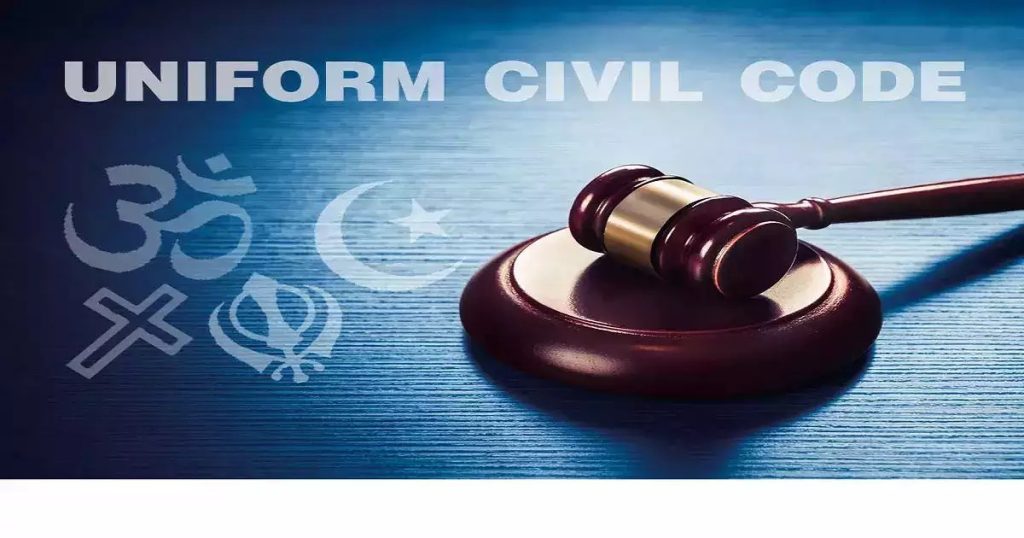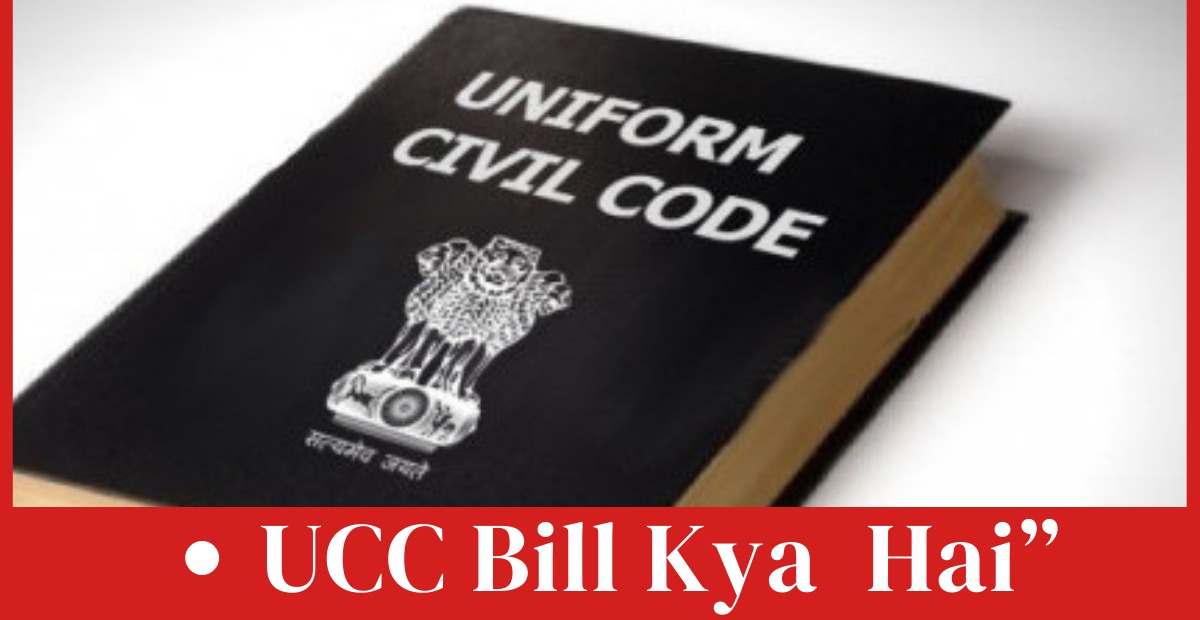“For all the citizens of the state, uniform laws regarding marriage, divorce, alimony, land, property, and inheritance will be enforced, regardless of the religion they follow.
Uttarakhand state was established in the year 2000, and the people of the state have always given the opportunity to govern to the Indian National Congress and the Bharatiya Janata Party.
However, to make history by securing victory for the second consecutive time, the Bharatiya Janata Party (BJP) formed the government immediately after the elections in March 2022. In the first cabinet meeting, they approved the formation of a committee of experts to prepare the UCC bill.
The UCC bill will be introduced in the Uttarakhand Legislative Assembly today. The UCC bill, which has been discussed across the country, will be introduced in the Uttarakhand Legislative Assembly today.
Please note that information about the bill has not yet been made public.
Regarding the UCC, the Chief Minister of Uttarakhand said on Monday that the proposed UCC will benefit all classes. The UCC bill contains many provisions.
In several existing UCC proposals across the country, there is a complete ban on multiple marriages and child marriages. The age of marriage will be uniform for girls of all religions, and there will be a uniform process for divorce.
There will be discussions during the four-day legislative session on the subject of equal rights for sons and daughters and maintaining unity in society.
This session will run from Monday to Thursday.
Benefits of UCC
- Uniform laws will be enforced for marriage and divorce across all religions in Uttarakhand.
- The law that applies to Hindus will also apply to other religions.
- No individual can marry more than one person without divorce.
- Muslims will no longer have the freedom to marry four times.
Pros and cons of the UCC:
Pros:
- Equality: A UCC could provide equal rights for all citizens, as everyone would follow the same laws, especially in matters like marriage, divorce, and inheritance.
- Justice: It could lead to a fairer legal system by removing religious-based differences in the law.
- Unity: A UCC might strengthen the sense of national unity by treating everyone equally under the law.
- Gender equality: By providing the same rights for men and women, it could help promote gender equality.
- Legal simplicity: A UCC could simplify the legal process by having one set of laws instead of different ones for different religions.
Cons:
- Cultural impact: It might impact the cultural and religious practices of various communities, leading to potential loss of tradition.
- Opposition from religious groups: Some religious groups may resist the change, feeling that their beliefs are being infringed upon.
- Implementation challenges: Creating and implementing a UCC could be difficult and time-consuming, given the diversity of the country.
- Lack of representation: Some communities might feel their views are not adequately represented in the development of a UCC.
- Social division: The push for a UCC might cause tension and division among different religious and cultural groups.
While UCC supporters argue that it is a progressive step towards protecting citizens’ rights and promoting equality, critics express concerns about potential violations of religious freedom and the imposition of a specific religious ideology.

Advantages of the UCC
- The Uniform Civil Code will ensure gender justice and equality by eliminating discrimination and harassment of women under various personal laws.
- It will provide equal rights and status to women in matters such as marriage, divorce, inheritance, adoption, and maintenance.
- The Uniform Civil Code will also grant people the right to gender equality, promoting its advancement.
- All citizens will be granted equal rights through the country’s legal system.
- The implementation of the Uniform Civil Code will improve the status of women in India, as the rights of women are limited in certain religions’ personal laws.
- Uniform rules will apply to women’s rights to their father’s property, adoption, and equal inheritance rights for daughters.
- When the UCC is implemented in the country, child marriages within the Muslim community will be prohibited to prevent early marriages for daughters.
- The implementation of the Uniform Civil Code will provide equal rights to the diverse communities in the country.
- The state government has been entrusted with the responsibility of uniformly applying the UCC law to the citizens.
- Any discrimination based on religion, caste, or race among citizens will be eliminated under the UCC.
- The Uniform Civil Code will simplify the laws that are currently different due to religious beliefs such as the Hindu Code Bill and Sharia law.
- In the Muslim community of the country, the Muslim Personal Law Board exists. Under this law, a married Muslim man can divorce his wife by saying “divorce” three times. Moreover, there are many other methods of divorce in Muslim law. These problems have to be endured by Muslim women. However, under the Uniform Civil Code, there will be only one type of divorce.
Arguments in favor of the Uniform Civil Code:
Dr. B.R. Ambedkar, the chairman of the Indian Constitution’s drafting committee, believed that the UCC is desirable, but after significant division in the Constituent Assembly, he proposed keeping it voluntary for now. Ambedkar said, “As a method for beginning, future parliaments might give that the code will just apply to the people who proclaim they will follow it.” In other words, initially, the “application of the code may be purely voluntary.” Ambedkar believed that the UCC could initially be introduced as a voluntary code and that Parliament would not compel citizens to follow it. Arguments are made in favor of the code.
Due to personal laws based on religion, the secular spirit of the Constitution is violated. Supporters of the code believe that every citizen has the right to equality before the law under Article 14, the prohibition of discrimination based on religion, caste, or gender under Article 15, and the right to life and privacy under Article 21. They argue that the absence of a Uniform Civil Code violates women’s fundamental rights. In matters such as marriage, divorce, and inheritance, the lack of uniform law results in discrimination against women. Supporters argue that there should be a Uniform Civil Code for gender and social equality. Supporters also state that Muslim women in society suffer from violence and discrimination due to personal laws based on religion. These women face the brunt of practices such as polygamy and Halala.
Arguments against the Uniform Civil Code
According to the Law Commission of India’s consultation paper on “Reform of Family Law” in August 2018, the UCC is neither necessary nor desirable at this point. To address discrimination and inequality in personal laws, existing family laws in all religions should be amended and codified. Minority communities have consistently opposed the Uniform Civil Code. Those arguing against it claim that under fundamental rights in the Constitution, every individual has the right to religious freedom between Articles 25 and 28. Therefore, imposing a uniform personal law on people of all religions is seen as tampering with the Constitution. Muslims view it as an intrusion into their religious affairs. The All India Muslim Personal Law Board (AIMPLB) has always labeled the Uniform Civil Code as unconstitutional and anti-minority. This board argues that the Constitution allows every citizen to live according to their religion. Because of this right, minorities and tribal groups are allowed to follow separate personal laws based on their customs, beliefs, and traditions.
What won’t change with the execution of UCC
The implementation of this law will not impact religious beliefs.
There will be no impact on religious customs and rituals.
It does not matter whether the marriage is performed by a priest or a Maulvi.
The implementation of the UCC will have no effect on anyone’s food, worship, or dress.
Uttarakhand will be the first state in the country to bring the UCC bill.
The Uniform Civil Code bill was introduced in the Uttarakhand Legislative Assembly on February 6, 2024.
In a special session of the Legislative Assembly called for the UCC bill, Chief Minister Pushkar Singh Dhami introduced the bill.
He stated that the “historic” Uniform Civil Code bill was presented in the assembly.
Why UCC is necessary
UCC supporters believe that it will promote gender equality, reduce discrimination based on religion, and help simplify the legal system. However, opponents argue that it violates religious freedom and personal laws should be left to the discretion of each religious community
You May Also Like: TechNewzArt

